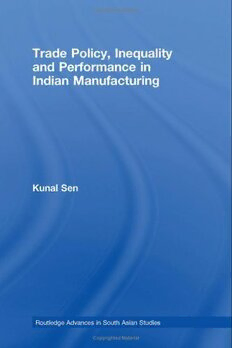
Trade Policy, Inequality and Performance in Indian Manufacturing (Routledge Advances in South Asian Studies) PDF
187 Pages·2008·2.163 MB·English
Most books are stored in the elastic cloud where traffic is expensive. For this reason, we have a limit on daily download.
Preview Trade Policy, Inequality and Performance in Indian Manufacturing (Routledge Advances in South Asian Studies)
Description:
The relationship between trade policy and economic performance is one of the oldest controversies in economic development. In recent years, there has been a revival of interest in the debate on the implications of trade reforms for productivity growth and domestic pricing behaviour due in part to the current phase of wide-spread trade liberalisation in developing countries and in part to developments in economic theory, notably endogenous growth theories and theories of imperfect competition. Also, there has been considerable interest in whether trade reforms can lead to higher wage inequality and regional inequality in developing countries. Both in academic and policy arenas the interest in international trade as a powerful positive force for reducing poverty in low-income countries has increased. In this book, the author examines the implications of trade reforms with specific reference to the Indian manufacturing sector. In particular, it explores the evolution of regional and wage inequality, employment, productivity and prices from the import substitution phase of the 1970s to the period of radical reforms of the 1990s. The strength of the book is the careful and systematic examination of the various aspects of the trade-development nexus using rigorous empirical methods and a detailed data-set of Indian industries from 1975 to 2000. Economists in general and South Asian scholars in particular will find this thorough study interesting and useful.
See more
The list of books you might like
Most books are stored in the elastic cloud where traffic is expensive. For this reason, we have a limit on daily download.
